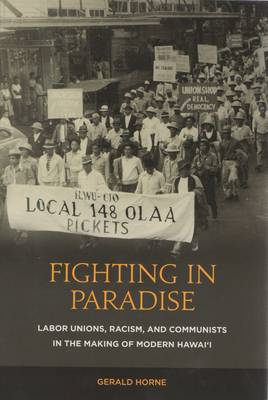
- Afhalen na 1 uur in een winkel met voorraad
- Gratis thuislevering in België vanaf € 30
- Ruim aanbod met 7 miljoen producten
- Afhalen na 1 uur in een winkel met voorraad
- Gratis thuislevering in België vanaf € 30
- Ruim aanbod met 7 miljoen producten
Zoeken
Fighting in Paradise
Labor Unions, Racism, and Communists in the Making of Modern Hawai'i
Gerald Horne
Hardcover | Engels
€ 112,95
+ 225 punten
Uitvoering
Omschrijving
Powerful labor movements played a critical role in shaping modern Hawaii, beginning in the 1930s, when International Longshore and Warehousemen's Union (ILWU) representatives were dispatched to the islands to organize plantation and dock laborers. They were stunned by the feudal conditions they found in Hawaii, where the majority of workers--Hawaiian, Japanese, Chinese, and Filipino in origin--were routinely subjected to repression and racism at the hands of white bosses.
The wartime civil liberties crackdown brought union organizing to a halt; but as the war wound down, Hawaii workers' frustrations boiled over, leading to an explosive success in the forming of unions. During the 1950s, just as the ILWU began a series of successful strikes and organizing drives, the union came under McCarthyite attacks and persecution. In the midst of these allegations, Hawaii's bid for statehood was being challenged by powerful voices in Washington who claimed that admitting Hawaii to the union would be tantamount to giving the Kremlin two votes in the U.S. Senate, while Jim Crow advocates worried that Hawaii's representatives would be enthusiastic supporters of pro-civil rights legislation. Hawaii's extensive social welfare system and the continuing power of unions to shape the state politically are a direct result of those troubled times. Based on exhaustive archival research in Hawaii, California, Washington, and elsewhere, Gerald Horne's gripping story of Hawaii workers' struggle to unionize reads like a suspense novel as it details for the first time how radicalism and racism helped shape Hawaii in the twentieth century.Specificaties
Betrokkenen
- Auteur(s):
- Uitgeverij:
Inhoud
- Aantal bladzijden:
- 472
- Taal:
- Engels
Eigenschappen
- Productcode (EAN):
- 9780824835026
- Verschijningsdatum:
- 31/07/2011
- Uitvoering:
- Hardcover
- Formaat:
- Genaaid
- Afmetingen:
- 152 mm x 229 mm
- Gewicht:
- 830 g

Alleen bij Standaard Boekhandel
+ 225 punten op je klantenkaart van Standaard Boekhandel
Beoordelingen
We publiceren alleen reviews die voldoen aan de voorwaarden voor reviews. Bekijk onze voorwaarden voor reviews.







